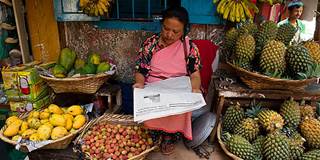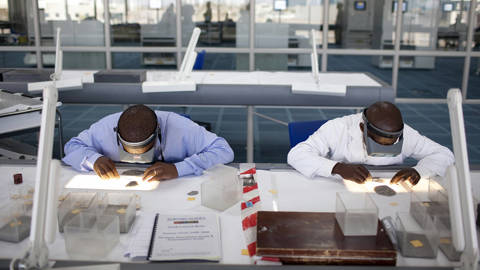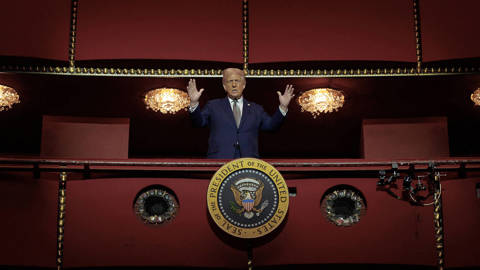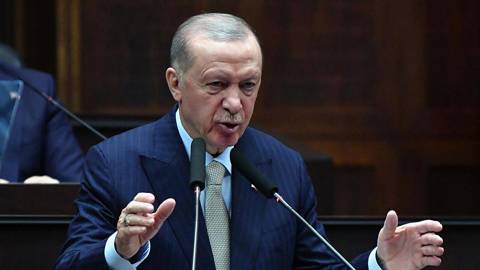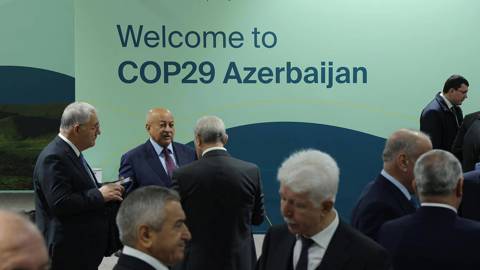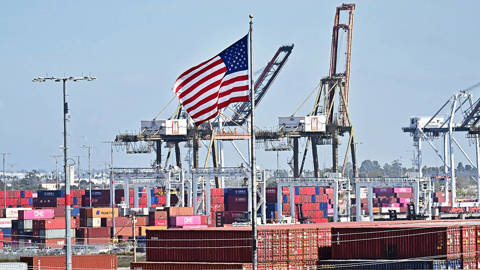Project Syndicate produces and delivers original, high-quality commentaries to a global audience. Featuring exclusive contributions by prominent political leaders, policymakers, scholars, business leaders, and civic activists from around the world, we provide news media and their readers with cutting-edge analysis and insight, regardless of ability to pay. Our membership includes over 500 media outlets – more than half of which receive our commentaries for free or at subsidized rates – in 156 countries.
[Project Syndicate is] not just well intentioned. It’s really, really good... Like Tribune Media Services or the Creators Syndicate Group, it syndicates columnists. But within that, it has a sort of unique model: It syndicates experts. Rather than Mark Shields and Froma Harrop, it’s got Brad DeLong and Nouriel Roubini and Joschka Fischer. And it adds new experts on topics relevant to the issues of the day... Best of all, you can read it online. For free. It’s like the world’s smartest op-ed page.
How we do it
News organizations in developed countries provide financial contributions for the rights to Project Syndicate commentaries, which enables us to offer these rights for free, or at subsidized rates, to newspapers and other media in the developing world.
Indeed, because our highest priority is to disseminate authors’ commentaries as widely as possible, we provide translations free of charge, enabling editors worldwide to publish them simultaneously. We currently translate authors’ commentaries from English into 13 languages (Arabic, Chinese, Dutch, French, German, Indonesian, Italian, Norwegian, Polish, Portuguese, Russian, Slovak, and Spanish). Member publications translate into 50 additional languages.
- 156 WE ARE ACTIVE IN 156 COUNTRIES
- 543 WE WORK WITH 543 MEDIA OUTLETS
- 1/2 MORE THAN HALF OF THESE OUTLETS RECEIVE OUR COMMENTARIES AT SUBSIDIZED RATES
- 66 OUR COMMENTARIES HAVE APPEARED IN 66 LANGUAGES
Our Reach
Because no publication is turned down solely on the basis of its ability to pay, Project Syndicate has cultivated strong partnerships with the most respected news media in every country in which it operates. This, in turn, has made Project Syndicate an even more attractive outlet for the world’s most eminent authors, for whom a truly global audience simply is not available elsewhere.
OUR CONTRIBUTORS
Only Project Syndicate can consistently tap the most insightful contributors – from Africa, Asia, Europe, and the Americas – to provide trenchant, authoritative analysis of the issues commanding global attention and promote viable solutions to the world’s urgent problems. As a result, we often play an agenda-shaping role for other news organizations.
Project Syndicate’s contributors are prominent politicians, policymakers, scholars, business leaders, and civic activists from six continents. They include Nobel laureates, heads of state, grassroots campaigners, and academic specialists in fields ranging from economics and politics to the natural sciences and cultural studies – all of whom bring to bear the credibility, diversity, and high-quality analysis that readers demand.
Our ability to reach readers worldwide is unparalleled. In 2024, Project Syndicate commentaries were published a total of 16,904 times around the world.
- 1,296 WE DISTRIBUTED 1,296 COMMENTARIES IN 2024
- 593 BY 593 CONTRIBUTORS
- 156 IN 156 COUNTRIES
- 16,904 IN 2024, PS COMMENTARIES WERE PUBLISHED 16,904 TIMES
We devote enormous resources to translating our commentaries into 13 languages. Providing these translations, often free of charge, enables editors worldwide to publish our commentaries simultaneously, thus encouraging debate on a global scale.
ARABIC/ CHINESE/ DUTCH/ FRENCH/ GERMAN/ INDONESIAN/ ITALIAN/ NORWEGIAN/ POLISH/ PORTUGUESE/ RUSSIAN/ SLOVAK/ SPANISH
Many of our members also translate our commentaries into local languages – for example, Bengali, Farsi, and Swahili. In 2024, our commentaries appeared in 66 languages in 156 countries.
Local publishing in local languages enables our commentaries to reach a wider, more diverse audience – and thus to create a more inclusive worldwide dialogue – than any “global” publication could ever possibly achieve.
How you can help
Ultimately, the backbone of Project Syndicate is readers like you: informed, engaged citizens around the world who appreciate the value of open, civil, high-level debate about issues of global concern. It is readers like you who strive to advance the common good by seeking cooperative solutions to collective problems. And, as the decline of print publication erodes news organizations’ traditional revenue models, it is readers like you who must help us ensure that all people, regardless of where they live or their income, continue to benefit from the insights and analysis that only Project Syndicate provides.
Our Network of Support
Prolonged global economic weakness since 2008 has exacerbated the impact of the long-term decline of print media on our financing model. In response, we have attracted support from foundations, enabling us to undertake major editorial initiatives on development, education, and sustainability issues, as well as to expand our offerings on Africa and Asia.
Project Syndicate’s public service mission has received support from the Open Society Foundations, the Bill & Melinda Gates Foundation, the MasterCard Foundation, the European Climate Foundation, the European Investment Bank, La Banque Postale, the European Journalism Centre, Dialectica, the Children’s Investment Fund Foundation, the Mohammed bin Rashid Al Maktoum Knowledge Foundation, the Heinrich Böll Stiftung, the Friedrich-Ebert-Stiftung, National Geographic, the World Bank group, GAM, the Google Digital News Initiative, the Nature Conservancy, and the International Economic Association.


